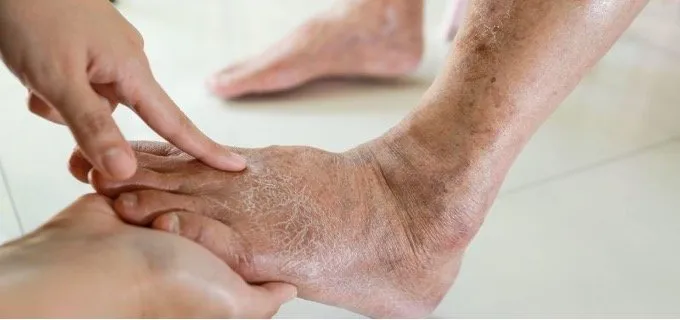
Lifestyle Adjustments to Prevent Lower Back Pain
September 19, 2025
When to Consult a Dermatologist for Anti-Aging Treatments
September 22, 2025Dermatology is the branch of medicine concerned with the diagnosis and treatment of conditions involving the skin, hair, and nails. While occasional dry skin is a common issue that often resolves with over-the-counter moisturizers, persistent, painful, or widespread dryness may indicate an underlying condition that requires professional evaluation. A board-certified dermatologist can diagnose the cause of severe dry skin and develop a management plan tailored to your needs. Here’s information on dry skin and when to visit with a dermatologist:
Eczema
Eczema, also known as atopic dermatitis, is a chronic condition characterized by dry, itchy, and inflamed skin. It often appears in childhood but can develop at any age. The condition results from a combination of genetic and environmental factors that compromise the skin’s barrier function. This makes the skin unable to retain moisture and protect against irritants effectively. While many manage mild eczema at home, certain symptoms suggest the need for a dermatologist’s care.
Contact a dermatology clinic if you experience symptoms that worsen or fail to respond to over-the-counter treatments. Some other reasons to visit a professional include:
- Skin Infections: Signs of infection are pus-filled blisters, yellow crusts, or spreading redness.
- Dry Patches: Especially those that do not improve.
- Cracked Skin: Painful, cracked, or bleeding skin may lead to infection.
- Severe Symptoms: Like itching and discomfort that interfere with daily activities or sleep.
Dermatitis
Dermatitis is a general term for skin inflammation, and it encompasses several types beyond atopic dermatitis. Contact dermatitis occurs when the skin reacts to a substance it touches, leading to a rash, itching, and sometimes blisters. It can be either irritant contact dermatitis, caused by repeated exposure to a mild irritant like soap or water, or allergic contact dermatitis, triggered by an allergen like poison ivy or nickel.
Another common form is seborrheic dermatitis, which primarily affects oily areas of the body, like the scalp, face, and chest. It causes scaly patches, red skin, and stubborn dandruff. Treatment for dermatitis varies based on the type and severity. A dermatologist may recommend specific antifungal or steroid shampoos for symptom relief. They may also recommend prescription creams, light therapy, or oral medications to control inflammation and dandruff. Identifying and avoiding triggers is also a key part of managing contact dermatitis.
Psoriasis
Psoriasis is an autoimmune disease that accelerates the life cycle of skin cells. This rapid cell turnover causes cells to accumulate on the skin’s surface, forming thick, silvery scales and itchy, dry, red patches that can be painful. Psoriasis is a chronic condition that tends to go through cycles, flaring for a few weeks or months, then subsiding for a time.
Seeking Professional Care
Anyone who suspects they have psoriasis should see a dermatologist for an accurate diagnosis and to rule out other skin conditions. Professional guidance is invaluable if the patches are widespread, painful, or located in sensitive areas. A dermatologist can confirm the diagnosis and discuss a range of treatment options, from topical ointments to systemic medications that address the underlying autoimmune response.
Managing Psoriasis Flares
Living with psoriasis often involves managing its flare-ups. A dermatologist can help you identify your specific triggers, which might include stress, skin injuries, or certain medications. They can provide effective strategies and prescribe treatments to control symptoms during a flare-up.
Schedule a Dermatology Appointment
If your dry skin is persistent, causing you discomfort, or not improving with home care, contact a dermatology provider today. A dermatologist can provide a diagnosis and create a comprehensive treatment plan to help you manage your skin condition and improve your quality of life. Consult with a specialist to learn more about effective skin treatments.





